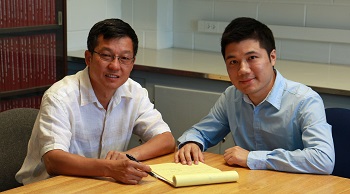
Image credit: Juergen Priewe / Shutterstock.com
Engineers at the University of Utah have found a new way to produce “topological insulators”, which possess a large band gap.
This study was led by Feng Liu, a materials science and engineering professor, at the University of Utah. Topological insulators could help develop superfast computers that do not heat when performing hi-speed calculations.
The topological insulators created were produced by placing a metal layer over a silicon semiconductor. These materials have the capability to externally conduct electricity, while internally behaving as an insulator. Fast spintronic devices and quantum computers could be built using the topological insulators.
 Feng Liu (left) and Miao Zhou (right) co-authored a new "topological insulator" that could lead to faster computing. Image credit: Dan Hixson, University of Utah College of Engineering.
Feng Liu (left) and Miao Zhou (right) co-authored a new "topological insulator" that could lead to faster computing. Image credit: Dan Hixson, University of Utah College of Engineering.
Scientists are striving to develop topological insulators that possess a large band gap. The band gap is equivalent to the energy required to free an outer shell electron in order to become a mobile charge carrier and therefore conduct electricity in materials.
A bigger band gap will enable conduction of electricity on the surface of the material. This would enable computers to function at room temperature in a stable manner. The method used needed to be cost-effective and able to be used along with existing techniques for producing silicon semiconductors.
The method involved depositing bismuth metal on silicon. A large, but stable band gap was created as the bismuth layer was bonded atomically to the silicon, but isolated electronically.
This process produces the largest predicted band gap for topological insulators and increases the possibility of developing quantum computers that can function at room-temperature.
This study which has received funding from the U.S. Department of Energy and the National Science Foundation has been published in the journal Proceedings of the National Academy of Sciences.
This News Feature Around the Web